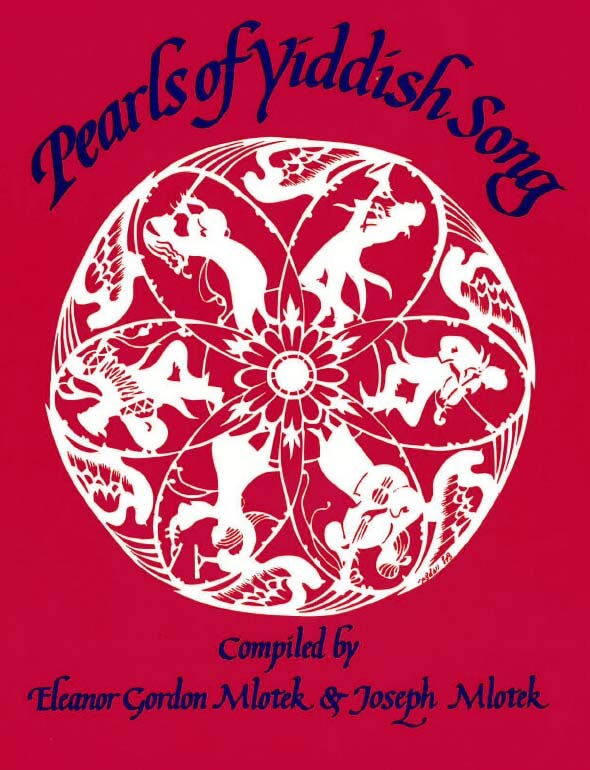Words by Wolf Younin (1908-1984); music by Vladimir Heifetz (1893-1970). Published in sheet music by Metro Music Co., N.Y., 1952. An adaptation for children appears in Yosl Mlotek’s textbook Yidishe kinder-alef (Jewish Children-A), N.Y., 1971.

Let us, let us, let us, let us
make a song of our own,
one-two-three, one-two-three
one-two, one-two, one-two-three.
About, about, about
a man, a Jewish blacksmith,
in his shop, in his shop,
in his blacksmith smithy—
-thy, -thy, -thy…
in his blacksmith smithy.
The Jew smiths away, the Jew, the Jew, the Jew
the Jewish blacksmith,
one-two-three, one-two-three
one-two, one-two, one-two-three.
And he, and he, and he
sings himself a song,
Jewish song, Jewish song,
sings a Jewish song the while.
The song resounds, the song, the song,
into the street, out into the street
one-two-three, one-two-three
one-two, one-two, one-two-three.
Resounds from street to street
from house to house—
from house to house—
the blacksmith’s song, the blacksmith’s song
the blacksmith’s song-smithy resounds.
Lomir, lomir, lomir, lomir,
Makhn an eygn lid.
Eyns-tsvey-dray, eyns-tsvey-dray,
Eysn-tsvey, eyns-tsvey, eyns-tsvey-dray.
Vegn, vegn, vegn
A yidn, a yid — a shmid,
In zayn shmid, in zayn shmid —
In zayn shmider, shmideray.
Ray-ray-ray. . .
In zayn shmider, shmideray.
Shmidt der yid, der yid, der yid, der yid
Der yid — der shmid,
Eyns-tsvey-dray, eyns-tsvey-dray,
Eysn-tsvey, eyns-tsvey, eyns-tsvey-dray.
Un er, un er, un er, un er
Zingt zikh tsu a lid,
Yidish-lid, yidish-lid,
Zingt a yidish-lid derbay.
Klingt dos lid, dos lid, dos lid
In gas, in gas aroys,
Eyns-tsvey-dray, eyns-tsvey-dray,
Eyns-tsvey, eyns-tsvey, eyns-tsvey-dray.
Klingt fun gas tsu gas,
Fun hoyz tsu hoyz, —
Fun hoyz tsu hoyz —
Shmiders lid, shmiders lid,
Klingt dem shmiders lideray.
לאָמיר, לאָמיר, לאָמיר, לאָמיר,
מאַכן אַן אײגן ליד,
אײנס־צװײ־דרײַ, אײנס־צװײ־דרײַ,
אײנס־צװײ, אײנס־צװײ, אײנס־צװײ־דרײַ.
װעגן, װעגן, װעגן
אַ ייִדן, אַ ייִד אַ שמיד —
אין זײַן שמיד, אין זײַן שמיד —
אין זײַן שמידער, שמידערײַ.
רײַ־רײַ־רײַ. . .
אין זײַן שמידער, שמידערײַ.
שמידט דער ייִד, דער ייִד, דער ייִד, דער ייִד
דער ייִד — דער שמיד,
אײנס־צװײ־דרײַ, אײנס־צװײ־דרײַ,
אײנס־צװײ, אײנס־צװײ, אײנס־צװײ־דרײַ.
און ער, און ער, און ער,
און ער זינגט זיך צו אַ ליד:
ייִדיש ליד, ייִדיש ליד,
זינגט אַ ייִדיש ליד דערבײַ.
קלינגט דאָס ליד, דאָס ליד, דאָס ליד,
אין גאַס, אין גאַס אַרױס,
אײנס־צװײ־דרײַ, אײנס־צװײ־דרײַ,
אײנס־צװײ, אײנס־צװײ, אײנס־צװײ־דרײַ.
קלינגט פֿון גאָס צו גאָס,
פֿון הױז צו הױז —
פֿון הױז צו הױז —
שמידערס ליד, שמידערס ליד,
קלינגט דעם שמידערס לידערײַ.
Song Title: Der Yid Der Shmid

First published in 1988 as Pearls of Yiddish Song: Favorite Folk, Art and Theatre Songs, this anthology contains 115 songs. Some material had never been published, while others, included in rare song collections or sheet music, were largely inaccessible. The songs presented reflect Jewish life in Eastern Europe and the United States and depict childhood, love, family celebrations, poverty, work and struggle. There are also songs from the Hasidic and Maskilic movements, songs of Zion and of America, as well as songs from the Yiddish theater.
The title of this anthology derives from the weekly two-page feature column “Pearls of Yiddish Poetry,” which the compilers Yosl and Chana Mlotek initiated in 1970 in the Yiddish newspaper Der Forvertz (the Yiddish Daily Forward). Hundreds of readers from around the world — including authors, composers, singers, actors — became co-participants in this collective folk project and recalled melodies, lines, fragments, stanzas and their variants of songs, poems, and plays which they had heard in their youth. At first, readers sent in only written material. Later, they also taped songs on cassettes, many of whose melodies had, until then, never been recorded. They also identified and supplied missing information regarding lyricists, poets, and composers and described the circumstances surrounding the songs’ origins, their dissemination, diffusion and impact.